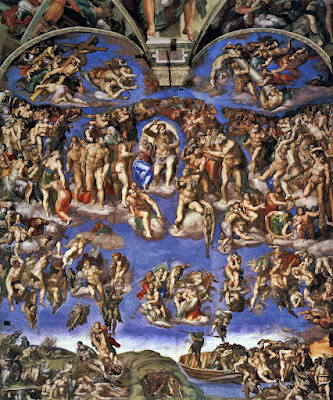| On the Road to Damascus |
 |
| Ecstasy of St Teresa of Avila |
| The Cliffs of Solva, Wales |
For sharing of contemplative thoughts and insights, interpreting life experiences and anecdotes in the Light of God's Word.
| On the Road to Damascus |
 |
| Ecstasy of St Teresa of Avila |
| The Cliffs of Solva, Wales |
 |
| Michelangelo's Last Judgement, Sistine Chapel |
I was converted to Christianity from a religion of ancestral worship and of praying with joss sticks to very fierce looking gods in the Chinese temples. I remember going to Haw Par Villa and staring in fear at the figurines of souls being tortured in hell. My mum would whisper in my ears this would be the fate of naughty children. My vivid memories when visiting the Chinese temples were the large statues of fearsome Taoist mythical gods down on me. They look merciless.
 My childhood home at Kim Chuan Road was about 200 metres from a neighbour who was a temple medium. Visitors would come to ask the medium to tell their fortune or bring offerings. Then he would performed a ritual in which he would go into a trance, whipped his body and cut his tongue with a sharp sword. I was so afraid each time I heard the clanging of gongs and cymbals; more so when returning home from school I had to pass by the house-temple just a few feet away as the medium went into a trance.
My childhood home at Kim Chuan Road was about 200 metres from a neighbour who was a temple medium. Visitors would come to ask the medium to tell their fortune or bring offerings. Then he would performed a ritual in which he would go into a trance, whipped his body and cut his tongue with a sharp sword. I was so afraid each time I heard the clanging of gongs and cymbals; more so when returning home from school I had to pass by the house-temple just a few feet away as the medium went into a trance.
There is a annual procession of the Nine-Emperor Gods from Lorong Tai Seng near where I lived, to Kusu Island. We were brought to watch the processions which were loud and noisy. The men who carried the palanquins of the gods would go into a trance, move and shake uncontrollably as the palanquins were made to sway from side to side. Firecrackers were lighted and thrown at the feet of the pall bearers. I was always frightened.
So, accompanying our parents to worship in these temples or being made to join the processions of the gods, children became acquainted with good and evil and the reality of hell. We grew up trapped in a fatalistic view of life and its inevitable cycles of naughty deeds and punishment. The only recourse, it seems, was to appease these Gods by offerings, incense, prayer and worship.
How can we can escape the entrapment; the fierce stares of these idols? How can we escape the gates of hell? How can we atone for our sins?
Fortunately from this religious background of deeds, rewards and retribution, I found the God of Christianity and discovered that my sins can be forgiven. I no longer need to live in fear of hell and recrimination. I discovered the compassionate God of Christianity whose forgiveness is well extolled in Psalm 103.
An interest in the Savior’s blood
Died He for me, who caused His pain
For me, who Him to death pursued?
Amazing love! How can it be
That Thou, my God, shouldst die for me?
Amazing love! How can it be
That Thou, my God, shouldst die for me?
He left His Father’s throne above
So free, so infinite His grace
Emptied Himself of all but love
And bled for Adam’s helpless race
‘Tis mercy all, immense and free
For O my God, it found out me!
Amazing love! How can it be,
That Thou, my God, shouldst die for me?
Long my imprisoned spirit lay,
Fast bound in sin and nature’s night
Thine eye diffused a quickening ray
I woke, the dungeon flamed with light
My chains fell off, my heart was free
I rose, went forth, and followed Thee
Amazing love! How can it be
That Thou, my God shouldst die for me?
No condemnation now I dread
Jesus, and all in Him, is mine
Alive in Him, my living Head
And clothed in righteousness divine
Bold I approach the eternal throne
And claim the crown, through Christ my own
Amazing love! How can it be
That Thou my God, shouldst die for me?
Ref 1 Shusaku Endo, Silence. New York: Taplinger Publishing Company, 1969
Ref 2: https://evidenceandanswers.org/article/silence-the-hidden-story-of-the-japanese-christians/
 |
| The Covid Cloud? |